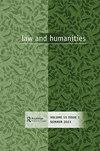Narratives of justice: Robert Cover’s moral creativity
IF 0.3
Q3 LAW
引用次数: 1
Abstract
ABSTRACT Robert Cover’s essay ‘Nomos and Narrative’ (1983) outlines a programme for an ambitious yet incomplete theory of law. While many interpreters focus on how it readdresses nomos, less attention is given to Cover’s notion of narrative. For Cover, narrative is not simply a complement to law that serves to pluralize it, but a key for a different conception of what law is, how it is constituted, and how it relates to sovereignty, morality and social commitment. In the context of the debates during the 1980s between legal positivists and naturalists, particularly around the question of hard cases, Cover’s contribution is that, instead of arguing about the different legal means required to fill what is perceived as a normative void, the narratival approach realizes that law is always socially and semantically contextualized. Hard cases, like crises of tradition or political breaking-points, are cases that uncover the working of narrative within law as a dynamic normative system. This paper argues that Cover’s work goes beyond the positivism-naturalism dilemma, as well as beyond the liberal framework of legal thinking and more broadly, towards a paradigm-shift in legal philosophy that I suggest calling poetical phronesis.正义叙事:罗伯特·盖弗的道德创造力
摘要Robert Cover的文章《Nomos and Narrative》(1983)概述了一个雄心勃勃但不完整的法律理论计划。虽然许多口译员关注它如何解读诺模斯,但很少关注Cover的叙事概念。对Cover来说,叙事不仅仅是对法律的补充,有助于使其多元化,而是对法律是什么、法律是如何构成以及法律如何与主权、道德和社会承诺相关的不同概念的关键。在20世纪80年代法律实证主义者和自然主义者之间的辩论中,特别是围绕棘手案件的问题,Cover的贡献是,叙事方法意识到法律总是社会化和语义化的,而不是争论填补被视为规范空白所需的不同法律手段。棘手的案件,如传统危机或政治转折点,是揭示叙事作为一个动态规范体系在法律中发挥作用的案件。本文认为,Cover的作品超越了实证主义自然主义的困境,也超越了自由主义的法律思维框架,更广泛地说,走向了法律哲学的范式转变,我建议称之为诗意的虚伪。
本文章由计算机程序翻译,如有差异,请以英文原文为准。
求助全文
约1分钟内获得全文
求助全文
来源期刊

Law and Humanities
LAW-
CiteScore
1.00
自引率
0.00%
发文量
21
期刊介绍:
Law and Humanities is a peer-reviewed journal, providing a forum for scholarly discourse within the arts and humanities around the subject of law. For this purpose, the arts and humanities disciplines are taken to include literature, history (including history of art), philosophy, theology, classics and the whole spectrum of performance and representational arts. The remit of the journal does not extend to consideration of the laws that regulate practical aspects of the arts and humanities (such as the law of intellectual property). Law and Humanities is principally concerned to engage with those aspects of human experience which are not empirically quantifiable or scientifically predictable. Each issue will carry four or five major articles of between 8,000 and 12,000 words each. The journal will also carry shorter papers (up to 4,000 words) sharing good practice in law and humanities education; reports of conferences; reviews of books, exhibitions, plays, concerts and other artistic publications.
 求助内容:
求助内容: 应助结果提醒方式:
应助结果提醒方式:


